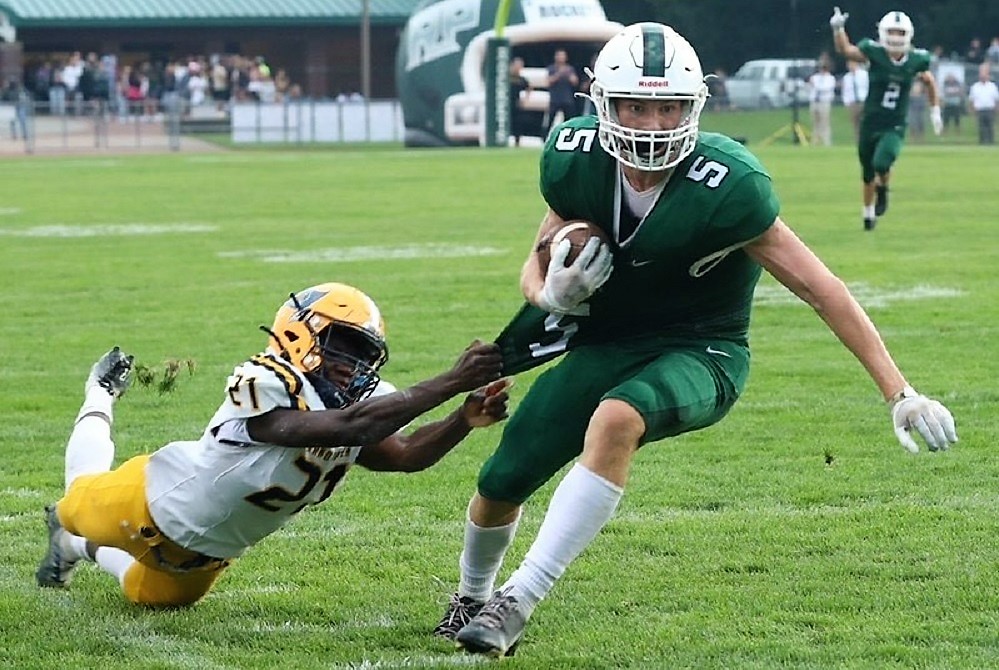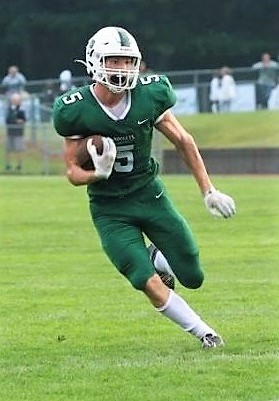
Talking Practice: Texas, Illinois Revise Policies
December 20, 2013
By Rob Kaminski
MHSAA benchmarks editor
Coaches and players in Texas and Illinois adapted to new football practice limitations this fall, with the Texas policy focusing on contact, and the Illinois regulation emphasizing length of preseason practices.
Following are the main changes those states put in place heading into the 2013-14 season:
The University Interscholastic League, which governs school sports in Texas, put into writing that, “During the regular season and postseason, no football player is allowed to participate in more than ninety (90) minutes of full contact practice per week,” effective with the first day of practice this fall.
The complete policy follows:
For the purposes of the of rule, "full contact" is defined as football drills or live game simulations where "live action" occurs. Live action, as defined by USA Football, is contact at game speed where players execute full tackles at a competitive pace taking players to the ground. A team may continue to dress in full pads for practice, but may only participate in live action drills and game time simulations no more than ninety minutes per athlete per week. It is assumed that when players are in shells (shorts, shoulder pads, and helmets) no live action drills or simulations will occur. This rule is intended to limit live action drills and simulations and not the number of practices a team may participate in full pads. A team may participate in "air," "bags," "wrap," and "thud" drills and simulations at any point. These contact levels are defined below:
• Air - Players should run unopposed without bags or any opposition
• Bags - activity is executed against a bag, shield or pad to allow for a soft-contact surface, with or without the resistance of a teammate or coach standing behind the bag.
• Wrap - Drills run at full speed until contact, which is above the waist with the players remaining on their feet.
• Thud - Same as wrap but tempo is competitive with no pre-determined winner and the players are not tackling to the ground.
 The rule came to the UIL Legislative Council as a recommendation from the UIL Medical Advisory Committee, a permanent advisory committee to the Legislative Council which meets twice each year to discuss and review safety policies for UIL participants. The committee, which is made up of leading medical professionals in various specialties and includes representatives from the Texas High School Coaches Association, the Texas Girls Coaches Association, and the Texas State Athletic Trainer Association, unanimously recommended this limitation in full-contact football practice.
The rule came to the UIL Legislative Council as a recommendation from the UIL Medical Advisory Committee, a permanent advisory committee to the Legislative Council which meets twice each year to discuss and review safety policies for UIL participants. The committee, which is made up of leading medical professionals in various specialties and includes representatives from the Texas High School Coaches Association, the Texas Girls Coaches Association, and the Texas State Athletic Trainer Association, unanimously recommended this limitation in full-contact football practice.
The rule formulates into a formal policy the existing actions of the majority of coaches across Texas, and most coaches have had to make few adjustments, if any. In fact, according to a story on statesman.com, the proposal caused more of an uproar on social media than from coaches.
“It’s not going to affect us in anyway,” Vandegrift HS coach Drew Sanders said in the story. “Most good coaches were way below that 90-minute amount already. Prior to legislation we still monitored it ourselves – the only change is now we have to keep up a log more publicly.”
Illinois put standards in place for its first 14 days of football practices, known as the state’s Preseason Football Acclimatization Practice Period. At the core of the policy is a three-hour practice limit for the first five days, during which teams can also conduct a one-hour walk-through.
 Teams must observe a minimum two hours rest between the practices and walk-throughs. Players may wear helmets only on the first two days, then helmets and shoulder pads for the next three. From days seven through 14 of the acclimatization period, schools may practice for a maximum of five hours per day, as long as that day is followed by a three-hour day, or an off day. During the five-hour days, no session can last more than three hours and must include a two-hour break between practices. Full pads may be worn for the final seven dates leading up to the first contest.
Teams must observe a minimum two hours rest between the practices and walk-throughs. Players may wear helmets only on the first two days, then helmets and shoulder pads for the next three. From days seven through 14 of the acclimatization period, schools may practice for a maximum of five hours per day, as long as that day is followed by a three-hour day, or an off day. During the five-hour days, no session can last more than three hours and must include a two-hour break between practices. Full pads may be worn for the final seven dates leading up to the first contest.
“This policy was the result of a collaborative effort between the IHSA Sports Medicine Advisory Committee and the Football Advisory Committee,” said SMAC committee member and University of Illinois Associate Professor of Orthopedic Surgery Dr. Preston M. Wolin. “The guidelines are based on the most recent scientific evidence, as well as the expertise of the coaches who will help implement them. Both committees believe the guidelines represent a significant positive contribution to the health of our athletes.”
“This new policy undoubtedly changes the way we, as coaches, approach preseason practice,” said Metamora HS coach Pat Ryan, who is a member of the FAC and a past President of the Illinois High School Football Coaches Association. “Coaches have to get more creative with when and how they schedule practices, as well what they do with their time. The proposals were strongly supported by both committees. It is a crucial final step to the process of being able to effectively prepare our teams in a safe manner. Change is always difficult, but the game is changing and we need to adapt to continue to put the safety of our players first.”
The IHSA offered multiple interactive online webinar meetings for high school coaches leading up to the start of practice where questions were answered, along with further clarifications on the policy and the science behind it.
“I think most coaches understood that changes were on the horizon,” said IHSA Executive Director Marty Hickman. “We wanted to be in a position to give our coaches as much information as possible to make sure they are comfortable with the new policy. Their input will be critical moving forward as we develop educational materials, like a best practices presentation. I commend our committees on a policy that is supported by medical experts, football coaches and school administrators.”

VanderLeest Working to Help Reeths-Puffer Make Most of Opportunities Ahead
By
Tom Kendra
Special for MHSAA.com
September 7, 2022
Tayte VanderLeest is a prototypical receiver and safety, with great size (6-foot-4, 200 pounds) and speed (4.5 seconds in the 40-yard dash).
 Muskegon Reeths-Puffer first-year coach Cody Kater also gushes about the senior’s work ethic and attitude, and concludes by saying, “He’s the kind of kid you want to date your daughter.”
Muskegon Reeths-Puffer first-year coach Cody Kater also gushes about the senior’s work ethic and attitude, and concludes by saying, “He’s the kind of kid you want to date your daughter.”
Weaknesses?
“I would say he’s too nice,” said Kater, a two-time all-stater at Montague who went on to play quarterback at Grand Rapids Community College and Central Michigan. “We’d like to see him a little grittier, but he’s a gamer and I have seen him flip that switch. I expect him to do that this Friday night.”
Reeths-Puffer (2-0) plays one of its biggest football games in years Friday, when it travels across town to face Muskegon (1-1) in the Ottawa-Kent Conference Green opener for both teams.
Historically, it hasn’t been much of a game, with Muskegon holding a lopsided 22-1-1 edge in the all-time series, and with most of those games in the blowout category. Muskegon has won the past nine games by an average of 44 points.
That puts the Rockets into a somewhat ideal position – no pressure, but with the opportunity to make a huge statement.
“It’s very exciting,” said VanderLeest, a returning all-conference receiver who has received interest from several Mid-American Conference schools including Central Michigan, Eastern Michigan and Miami (Ohio). “We are 2-0, which is great, but this is the kind of game where we can really prove ourselves. We want to show that we belong in big games like this.”
Puffer opened the season with a convincing 32-20 win over visiting Grand Haven, then hit the road last Thursday for a 38-14 win over St. Johns.
Muskegon, meanwhile, has not looked like its normal dominating self thus far (although playing a pair of strong opponents certainly has been a contributing factor). The Big Reds rallied from an eight-point, fourth-quarter deficit for a 20-14 win over visiting East Kentwood in the opener, then lost 49-16 on Friday to reigning Division 2 champion Warren De La Salle Collegiate. East Kentwood bounced back last week to defeat Bloomfield Hills Brother Rice, and De La Salle hasn’t lost since the 2020 Division 2 championship game.
Some of the issues for Muskegon are injuries and youth, with 13th-year head coach Shane Fairfield looking for more seniors to step up in leadership roles.
 VanderLeest and other strong senior leaders like quarterback Brady Ross and center/defensive tackle Hunter Allison have sparked the Rockets’ quick start. The soft-spoken VanderLeest is more of a leader-by-example, although Kater said he has noticed him becoming more vocal with the younger receivers and defensive backs.
VanderLeest and other strong senior leaders like quarterback Brady Ross and center/defensive tackle Hunter Allison have sparked the Rockets’ quick start. The soft-spoken VanderLeest is more of a leader-by-example, although Kater said he has noticed him becoming more vocal with the younger receivers and defensive backs.
VanderLeest is one of those players who has football in his blood, literally, as his father Rob VanderLeest was an all-state lineman at Muskegon Catholic Central and went on to play four years at Michigan under Gary Moeller and Lloyd Carr.
“Football is in my DNA,” explained Tayte VanderLeest. “It’s been part of my life as long as I can remember. Now I’m a senior, and I feel the pressure on me to live up to the standards that my dad set.”
He will play a key role defensively from his strong safety spot, where one of his main duties will be trying to tackle Muskegon’s dynamic junior duo of running back Jakob Price and slotback Destin Piggee, preventing long TD runs and forcing the Big Reds to march the ball down the field.
VanderLeest had five tackles and an interception last week at St. Johns, in a game that was tied at halftime before Puffer pulled away with a 24-0 scoring edge in the second half.
“He has a knack defensively for knowing where he needs to be and always ending up around the ball,” explained Kater, who also was the offensive coordinator at Montague during the 2020 season, helping the Wildcats to an undefeated record and the Division 6 championship. “A lot of that stuff you can’t really teach. Because of that, we’re letting him roam around a little bit back there.”
On offense, VanderLeest and fellow senior wideout Clyde Bartee are the Rockets’ home run threats. Kater also lauded the stalk blocking of that duo during the first two games, allowing Ross and junior running back Brody Johnson to find running room downfield.
VanderLeest, who had five touchdown receptions last year en route to first-team all-OK Green honors, had a big game offensively in the opener against Grand Haven, making six catches for 106 yards – highlighted by a 47-yard touchdown reception.
Another storyline going into Friday’s game involves Kater, who played for former Muskegon coach Tony Annese at GRCC and was hired last spring as Muskegon’s offensive coordinator. However, Kater departed shortly thereafter to join former Lowell coach Noel Dean’s staff in Tipton, Ga. Kater then returned to West Michigan on Dec. 31, when he was named Puffer’s new coach.
Kater, 30, is calling the offensive plays for R-P, while his former CMU teammate Alex Smith – who most recently served as head coach at Holton – is the defensive coordinator.
The bigger goal for the Rockets, beyond this week’s showdown at historic Hackley Stadium, is to get into the playoffs and then win a playoff game – something they have not done in 30 years since their memorable, undefeated 1992 season, which ended with a Class A title.
Puffer has qualified for the playoffs five times since that championship season, but each of those postseason appearances were “one and done.”
Kater is encouraged that R-P has enough high school football players to field freshman, junior varsity and varsity teams – something that less than half of the teams in the O-K Green can claim. He also notes that the Rockets have good athletes and numbers in their middle school and youth programs.
He believes this year’s senior leaders like VanderLeest, who hung in there through a 3-6 junior season and a coaching change, will be remembered as the ones who turned the tide.
“I don’t think you’ve seen the best of Tayte yet,” said Kater, the sixth head coach for the Rockets since Hall of Famer Pete Kutches led them to that 1992 title. “We are coaching him extremely hard, and he is getting better. He is a pillar of our team.”
 Tom Kendra worked 23 years at The Muskegon Chronicle, including five as assistant sports editor and the final six as sports editor through 2011. E-mail him at [email protected] with story ideas for Muskegon, Oceana, Mason, Lake, Oceola, Mecosta and Newaygo counties.
Tom Kendra worked 23 years at The Muskegon Chronicle, including five as assistant sports editor and the final six as sports editor through 2011. E-mail him at [email protected] with story ideas for Muskegon, Oceana, Mason, Lake, Oceola, Mecosta and Newaygo counties.
PHOTOS (Top) Muskegon Reeths-Puffer’s Tayte VanderLeest (5) works to break away from a Grand Haven defender during an opening-night win. (Middle) VanderLeest cuts upfield during the 32-20 victory. (Photos by Joe Lane.)

